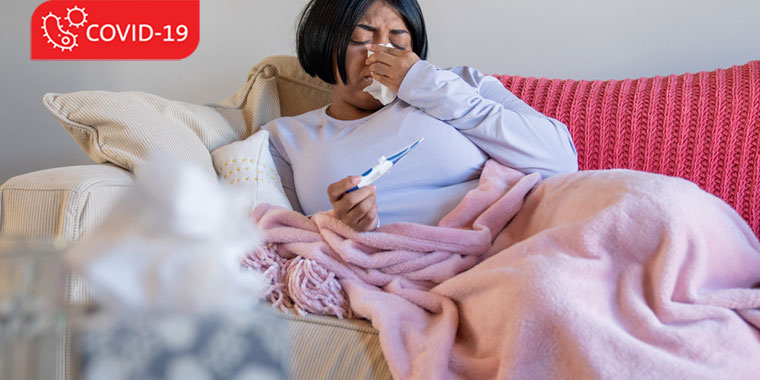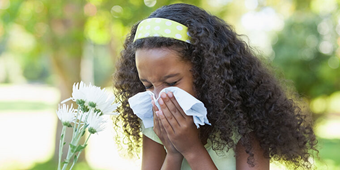You Feel Sick. Is It COVID, a Cold, Or the Flu?

Answer a few questions and we'll provide you with a list of primary care providers that best fit your needs.
COVID-19, the flu and the common cold are all contagious respiratory illnesses. All three share similar symptoms. This sets the stage for a tricky fall and winter flu season.
How do you know which illness you have? What symptoms require quarantine? When should you get tested? For answers, we talked with Joseph Allen, MD, FAAFP, of Premier Health Family Care of Vandalia.
Dr. Allen assures us that there are many steps you can take to keep you and your family healthy and protect those around you from COVID and the flu.
Get Your Flu Shot
The best defense against the flu is the flu vaccine. When you get a flu shot, you protect yourself and others from getting the flu and you help reduce the burden on the health care system.
Everyone should get the flu vaccine as soon as they can, says Dr. Allen. The vaccine is especially important this year as we prepare for a flu season in the middle of the COVID-19 pandemic.
“The vaccine does protect from co-infections,” says Dr. Allen. “Getting the flu and COVID at the same time could lead to serious illness.”
Follow Prevention Measures
COVID, the flu, and colds spread through respiratory droplets. The same prevention guidelines recommended to prevent COVID also keep the flu and colds at bay. Remember to keep following these safety measures:
- Avoid close physical contact like shaking hands
- Avoid touching contaminated surfaces
- Maintain social distance of at least 6 feet
- Wash your hands often
- Use hand sanitizer when you can’t wash your hands
- Wear a face mask
Know the Symptoms of Colds, COVID, And the Flu
“The two symptoms that only show up with COVID are the loss of taste and the loss of smell,” says Dr. Allen. “Not everyone who has COVID has these symptoms, but many people who test positive do lose their sense of taste and smell.”
A cold brings on symptoms within two or three days. They are mild and include:
- Coughing
- Mucus dripping down your throat (post-nasal drip)
- Runny nose
- Sneezing
- Sore throat
- Stuffy nose
- Watery eyes
Most people do not get a fever with a cold, but it can occur in some.
COVID-19 symptoms range from mild to severe. They typically occur two to 14 days after exposure, says the Centers for Disease Control and Prevention. COVID-19 symptoms include:
- Congestion or runny nose
- Cough
- Diarrhea
- Fatigue
- Fever or chills
- Headache
- Muscle or body aches
- Nausea or vomiting
- New loss of taste or smell
- Shortness of breath or difficulty breathing
- Sore throat
Flu causes mild to severe illness. Flu starts suddenly. Symptoms include:
- Cough
- Fatigue
- Fever or feeling feverish/chills
- Headaches
- Muscle or body aches
- Runny or stuffy nose
- Sore throat
- Vomiting and diarrhea (more common in children)
When To Call Your Doctor
If your symptoms align with those of COVID or you’re not sure if you have COVID or the flu, call your doctor.
If you had a flu shot four to six weeks before getting sick, you have some immunity for the flu, says Dr. Allen. Your doctor may treat you with Tamiflu. This medicine reduces flu symptoms and can shorten your illness by a day or two.
Your doctor can test you for the flu and COVID at the same time. It is safe to take Tamiflu while you wait for test results. Tamiflu is most effective if taken as soon as symptoms begin.
Treatments for COVID, the flu, and colds are similar. You should:
- Drink plenty of fluids
- Get plenty of rest
- Take medicine to reduce fever and headaches
- Use a humidifier when sleeping to ease breathing
Do You Need a COVID Test?
If you have symptoms of COVID or flu, quarantine yourself. Dr. Allen says to wait five days before getting tested. If you get tested too early, the test might not pick up the virus, he explains.
“The thing that worries me more than anything is false negative tests,” Dr. Allen says. “If you get a false positive, we tell you to self-quarantine and protect others from infection. If you get a false negative, you don’t self-quarantine and there is a high potential to spread the disease to others.”
Keep Yourself And Your Family Healthy
You can take lots of actions to help your body stay healthy. Dr. Allen recommends these tips to stay healthy and fight off infection:
- Eat a healthy diet.
- Get enough sleep.
- Get plenty of exercise.
- Keep chronic illnesses under control.
- Take Zinc or a multivitamin. Dr. Allen says studies show that zinc helps your body fight off viruses.
Answer a few questions and we'll provide you with a list of primary care providers that best fit your needs.
Sources: Joseph Allen, MD, FAAFP, Premier Health Family Care of Vandalia; Centers for Disease Control and Prevention





